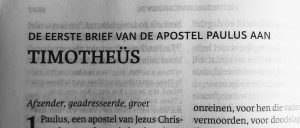Piety connects?
Underneath the head "Mennonite: Piety connects Christians of various traditions” there was an article in the RD yesterday about Andrew Dyck's promotion on September 5 at the VU in Amsterdam. Without going through the entire article here, a few things struck me.
First, you should learn the sad fact that part of the Mennonite Brotherhood is already “certain practices of spiritual direction[1], the lectio divina and the singing practice of Taizé self-madet” have.
Then it is sad that the PhD student interprets all this positively and does not wonder whether the bible also says something about this.
Furthermore, the Dutch title of the thesis stands out: Bidden zoals katholieken? It wasn't in the article, but on the website of the VU.

That shows exactly what it's all about. The aim is for all Christians to rediscover the old traditions and thus be led into idolatry. Ignatius, Benedict and Taizé are sources you can draw on to discover”that you can experience God and His presence in everyday life" (see dissertation content, page xi). It is the aim of the Roman Church to immerse all Christian communities in contemplation.
The consequence is of course that all Christians who (re)discover this also experience a special unity and connection. For this mystical experience connects and creates unity. But it is not the piety that Paul means when he encourages us to 'practice in godliness' (1 Timothy 4:7).
Contemplation pervades all communities
Let's assume the following:
- that after the rapture of the Church comes a period when God will judge Christendom (the great harlot, Babylon, Revelation 17 and 18).
- that Christendom is then full of demons and the consequences of their work (eg Revelation 18:2,5)
- that we are now living just before the rapture of the Church.
Then isn't it logical that we now see a development around us in which idolatrous contemplative practices permeate all of Christendom? You cannot draw any other conclusion and you see it when you look around you. Things you wouldn't have thought possible 20 years ago, like for example
- the demise of the Mennonite Brotherhood in Canada (see above mentioned thesis),
- the 'Christian meditation' in all kinds of churches and circles (see the previous post),
- Ann Voskamp's second book that still more people will draw into contemplation than the first,
- the 'reconciliation' of Protestants with the Roman Church after 500 years of the Reformation, so that people such as Ouweneel, for example, could not benefit from the Roman Church no errant church call more,
- And so on…..
You don't have to join the Roman Church, as long as you adopt their practices and spirituality.
Does God know about it, did Paul know about it?
You may wonder if we're not just fooling each other by continuing to warn against these kinds of things?
- If it's really that serious, wouldn't it make sense for God to know about it?
- And if the Bible is God-given "light to our path," wouldn't these things be in God's Word?
- Or even more concretely: would Paul not know about it and have written about it? He was appointed by God as 'teacher of the heathen' (1 Timothy 2:7) And would he not have told us about the religion of the Gentiles and the dangers to us Christians?
I've been working on Paul's first letter to Timothy for some time now and I'm amazed at how many references to contemplation and monastic tradition I come across. Paul makes it clear that those who engage in this are falling away from their faith and are spiritually shipwrecked.

In the first letter to the church in Corinth we have already come across extensive teaching about and against idolatry (1 Corinthians 8-11). But in this personal letter to Timothy it becomes even more concrete. What about the following expressions and words.
- the conscience or consciousness (1:5,19;4:2)
- deception by satan and demons (2:14;4:1)
- the asceticism (abstinence from sex and food), exercise of the body (4:3, 8) as a means of living 'piously' and closer to God. Isn't that characteristic of monastic life?
- teachings of demons (4:1), myths ("fabrications";1:4;4:7), meaningless, meaningless and unholy talk (1:6; 4:7; 6:20)
- deviating, going astray and falling away (from the faith) (1:6;6:21;6:10;4:1)
More on 1 Timothy on this site soon D.V.
“But you, O man of God, flee these things. Pursue righteousness, godliness, faith, love, endurance, and meekness. Fight the good fight of faith” (1 Timothy 6:11,12).
[1] Here he calls 'spiritual guidance' or 'spiritual direction'. If you search for this you will find: a site that trains people worldwide to pass on 'the contemplative gospel'.



